Hi there, fellow dog lover! If you’re here, you’re likely a proud parent of a Boston Terrier, or perhaps considering adopting one. Either way, I’m glad you’re taking the time to learn about Boston Terrier Eye Health. As a holistic veterinarian, I can tell you that understanding breed-specific health issues is a critical part of responsible pet ownership.
Boston Terriers are known for their distinctive, expressive eyes. But those beautiful eyes can be prone to specific health issues. Don’t worry, though! With knowledge and proactive care, you can help keep your Boston Terrier’s eyes healthy. And I’m here to guide you through it.
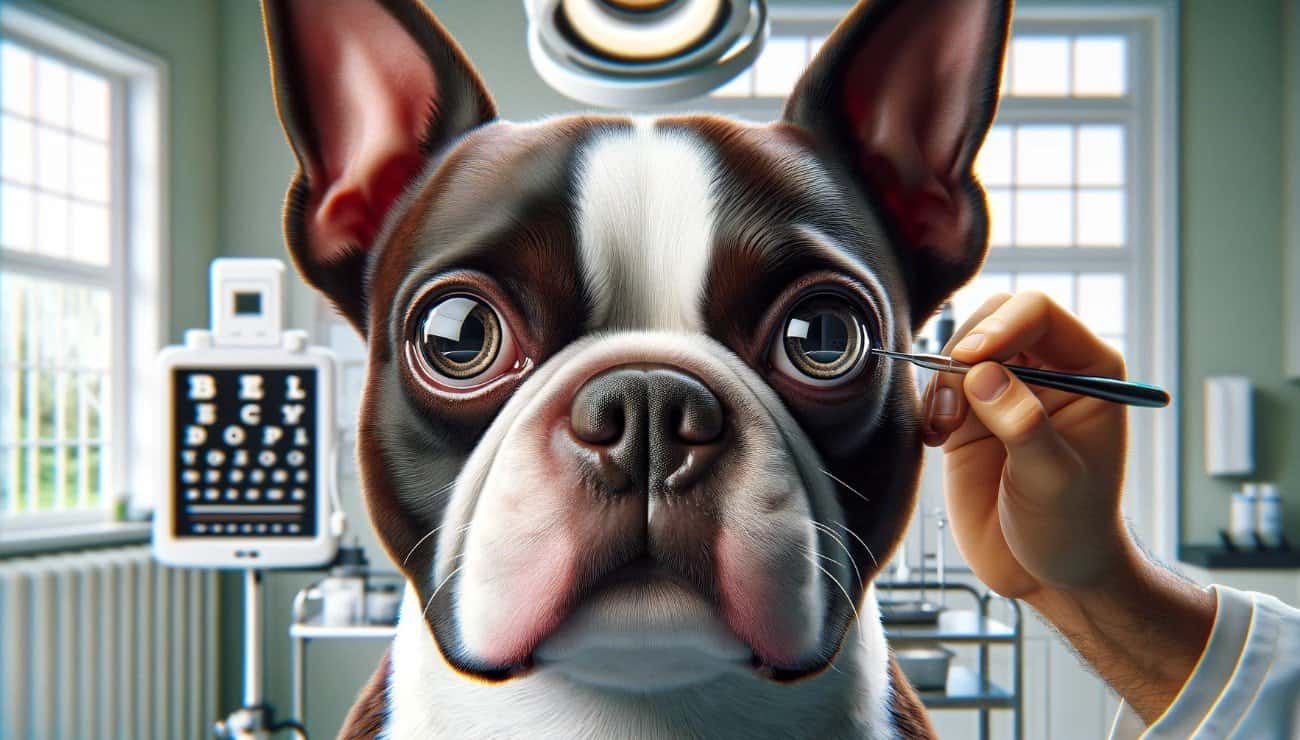
In this article, we’ll explore the unique eye structure of Boston Terriers, the common eye problems they can face, and how to prevent these issues. We’ll also discuss the importance of a holistic diet, environmental hygiene, and routine eye care in maintaining your Boston Terrier’s eye health. So, let’s get started on ensuring those adorable eyes stay bright and healthy!
Understanding Breed Specific Eye Structure
As a Boston Terrier parent, you’ve probably noticed and adored your furry friend’s large, expressive eyes. But have you ever wondered how their unique eye structure can affect their health? Understandably, the health of those precious eyes is a top priority for you and knowing the specifics of their structure can help you keep them healthy and sparkling.
Boston Terriers, lovingly nicknamed ‘American Gentlemen’, are a brachycephalic breed. This means they have a short nose and a flat face, a trait that gives them their signature adorable look, but also leads to a prominent eye structure. Their eyes are larger and more forward-facing than other breeds, which unfortunately makes them more susceptible to various eye problems.
Their prominent eyes have a larger exposed corneal surface, which is the clear, outer layer of the eye. This can lead to more exposure to environmental irritants and potential injuries. Additionally, Boston Terriers have a shallow eye socket which means their eyes have less protection from potential traumas.
Another structural concern is the breed’s ‘dry eye’ condition, or keratoconjunctivitis sicca (KCS). Boston Terriers, like other brachycephalic breeds, often struggle with tear production which can lead to chronic dryness and irritation. This can also contribute to corneal ulcers, a painful condition that needs immediate veterinary attention.
Understanding your Boston Terrier’s specific eye structure isn’t just interesting – it’s vital for maintaining their eye health and ensuring they live a comfortable, happy life. Being aware of their unique eye structure can help you identify potential issues early, seek appropriate treatment, and even take preventative measures. So remember, those big, beautiful eyes are not just for melting your heart – they also deserve your care and attention!
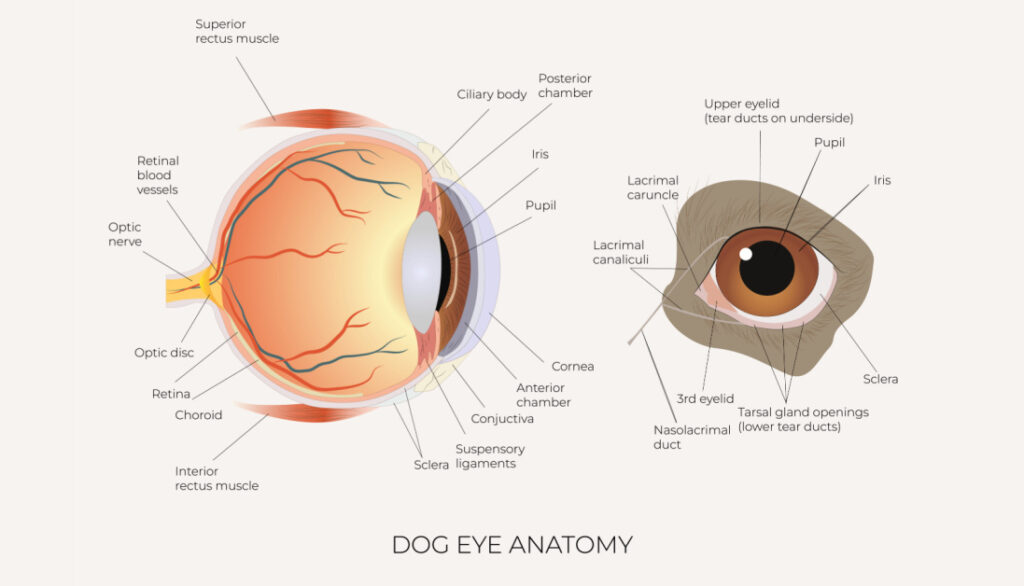
Common Eye Issues In Boston Terrier
As a veterinarian, I have treated many Boston Terriers and I can tell you that these lovely little dogs are prone to certain eye issues due to their unique eye structure. Understanding these issues can go a long way in preserving your Boston Terrier’s eye health and ensuring they lead a comfortable and happy life.
One of the most common eye problems that Boston Terriers face is Corneal Ulcers. This is a condition where the cornea, the clear outer layer of the eye, gets damaged, leading to discomfort, redness, and sometimes, loss of vision. The main cause of this condition is trauma, but it can also be a result of dry eye or keratoconjunctivitis sicca, a condition where the eyes don’t produce enough tears.
Cataracts are another common issue in Boston Terriers. This is a condition where the lens of the eye becomes cloudy, resulting in impaired vision or blindness. This is often genetic in nature and can affect Boston Terriers at any age.
Boston Terriers are also prone to a condition called Cherry Eye. This happens when the gland in the third eyelid prolapses and becomes visible, looking like a red cherry in the corner of the eye. It’s not painful but it can be uncomfortable and lead to further eye problems if not treated.
Glaucoma is a serious condition that can affect Boston Terriers. This is when the pressure inside the eye increases, leading to pain, redness, and if left untreated, blindness. It’s important to catch this early, so regular vet check-ups are crucial.
Lastly, Distichiasis, a condition where an extra row of eyelashes grows and rubs against the eye, can be seen in Boston Terriers. This can cause discomfort, redness, and corneal ulcers.
As a responsible Boston Terrier parent, it’s important to be aware of these common eye issues and to monitor your dog’s eyes regularly for any signs of these conditions. Early detection is key to preserving your Boston Terrier’s eye health and ensuring they live a long and happy life.
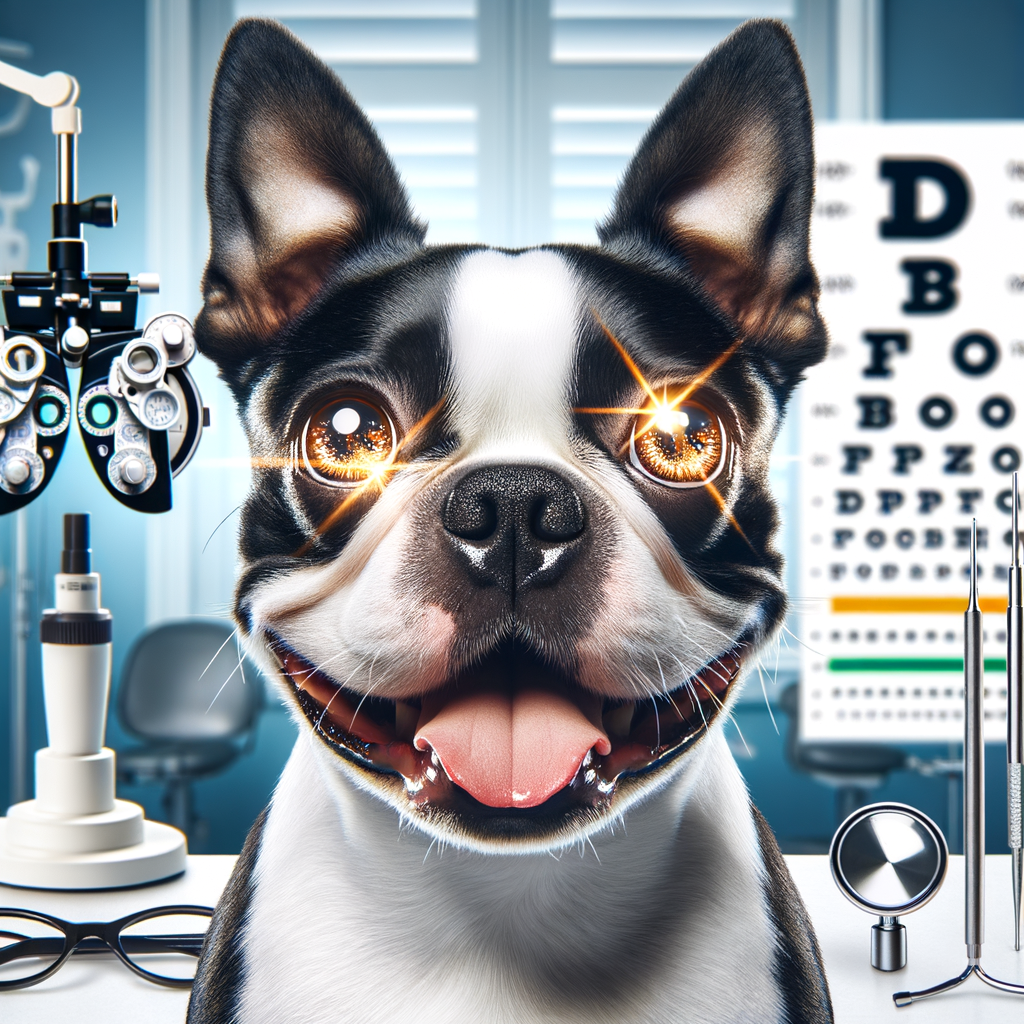
Nourishing Your Dog’s Vision: Essential Nutrients for Eye Health
Ensuring your Boston Terrier gets the right nutrients for optimal eye health is essential for maintaining clear vision and preventing age-related issues. Natural, nutrient-rich foods and supplements can play a key role in supporting their eyesight. From vitamin A-packed freeze-dried liver treats to antioxidant-rich blueberries and targeted supplements like Eyeplex by Standard Process, there are several ways to nourish your dog’s eyes. In this section, we’ll explore how these powerful ingredients contribute to long-term vision health and overall well-being.
Eyeplex by Standard Process
Eyeplex by Standard Process is a specialized supplement designed to support your Boston Terrier’s eye health with a blend of essential nutrients. Formulated with key vitamins, minerals, and antioxidants, Eyeplex helps protect against oxidative stress, supports retinal function, and promotes overall vision health. Ingredients like vitamin A, vitamin C, and zinc contribute to maintaining strong eyesight, while whole food ingredients provide additional phytonutrients for cellular protection. Adding Eyeplex to your Boston Terrier’s diet can be especially beneficial for aging dogs or breeds prone to eye conditions, offering targeted nutritional support to keep their vision sharp and healthy for years to come.
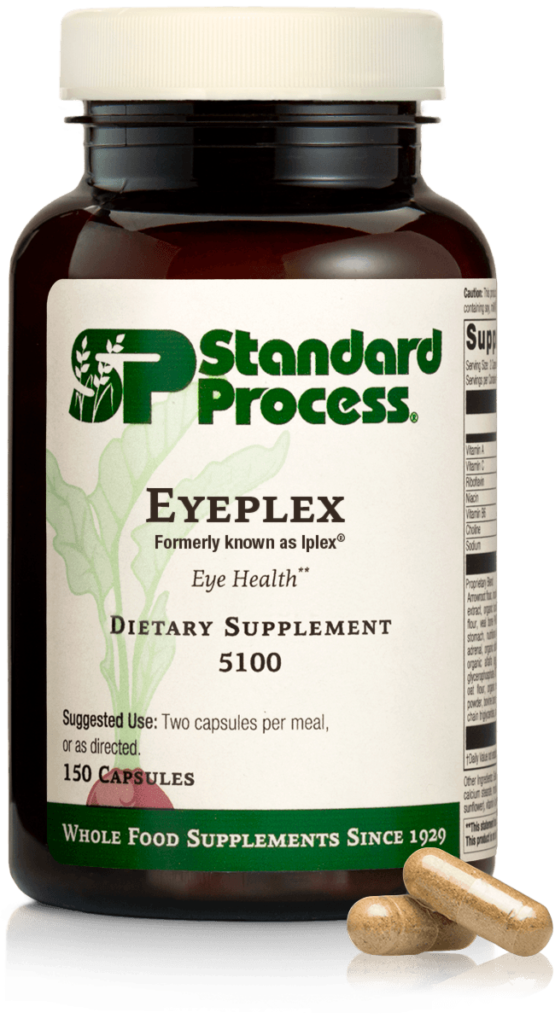
Freeze-Dried Blueberries
Freeze-dried blueberries are a powerhouse of antioxidants that can help protect your Boston Terrier’s eyes from oxidative stress and age-related damage. Rich in vitamins C and E, as well as anthocyanins, these tiny but mighty berries help combat free radicals that can contribute to eye diseases like cataracts and macular degeneration. Incorporating freeze-dried blueberries into your dog’s diet provides a natural and delicious way to support retinal health, reduce inflammation, and promote overall vision longevity. Plus, they’re a low-calorie, dog-friendly treat that makes a great addition to a balanced diet for long-term eye health.
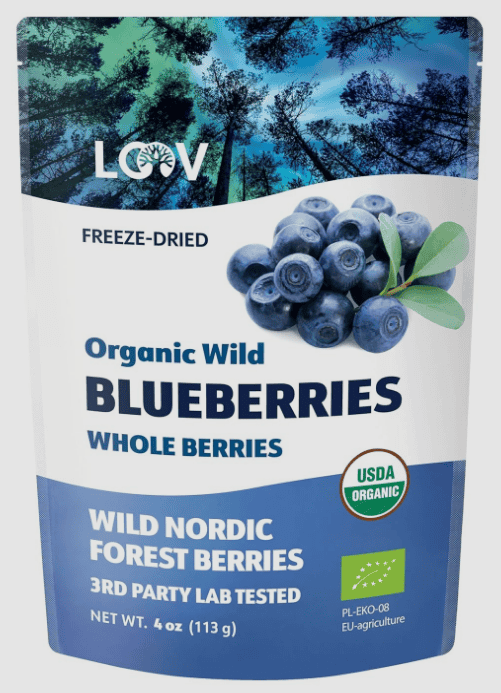
Freeze-Dried Liver
Freeze-dried liver treats are an excellent natural source of vitamin A, an essential nutrient for your Boston Terrier’s eye health. Vitamin A plays a crucial role in maintaining good vision, especially in low-light conditions, while also supporting overall immune function and skin health. Since liver is rich in bioavailable vitamin A, incorporating freeze-dried liver treats into your dog’s diet provides a convenient and nutritious way to promote optimal eye function. Just be sure to feed them in moderation, as excessive vitamin A can lead to toxicity. Adding these nutrient-packed treats to your pup’s routine is a simple, tasty way to support their long-term vision and well-being!

By prioritizing your Boston Terrier’s eye health through a balanced diet and nutritional supplements, you can help prevent many common eye issues. These simple steps can go a long way in ensuring your pup’s eyes stay healthy and clear for years to come.A, Vitamin E, and antioxidants can be beneficial for your Boston Terrier’s eye health. However, always consult with your vet before starting any supplement regime to ensure it’s suitable for your pet’s unique needs.
Remember, the goal is to enhance your Boston Terrier’s overall health, which will, in turn, support their Boston Terrier Eye Health. By providing a balanced diet and the right supplements, you can help to prevent many common eye issues and keep your Boston Terrier’s eyes bright and healthy.
Environmental Hygiene To Reduce Eye Problems
When it comes to Boston Terrier eye health, the environment plays a significant role. Keeping your home clean and free from irritants can help prevent common eye problems in your Boston Terrier. Here are some aspects of environmental hygiene that you should consider:
Indoor Air Quality
Indoor air quality is crucial for your Boston Terrier’s overall health, especially for their eyes. Boston Terriers, with their protruding eyes, are more susceptible to airborne irritants. Dust, smoke, and pet dander can cause eye irritation, leading to conditions like conjunctivitis or dry eye.
- Regular Cleaning: Regularly clean your home to reduce dust and pet dander. Vacuum carpets and rugs, and wipe down surfaces with a damp cloth.
- Air Purifiers: Consider investing in an air purifier, especially if someone in the house smokes. Air purifiers can help remove allergens and irritants from the air.
- Humidifiers: Dry air can exacerbate eye problems. Using a humidifier can help keep your Boston Terrier’s eyes moist and healthy.
Sprays, Diffusers, Candles, Incense
Scents from sprays, diffusers, candles, and incense can irritate your Boston Terrier’s eyes. These products often contain chemicals that can cause eye irritation, leading to redness, itching, and even infections.
- Choose Unscented Products: Opt for unscented cleaning products and avoid using air fresheners. If you must use scented products, ensure your Boston Terrier is in a different room and ventilate the area afterwards.
- Be Careful with Candles and Incense: If you enjoy burning candles or incense, do so in a well-ventilated area, away from your Boston Terrier. Keep an eye on your pet to ensure they don’t come into direct contact with the smoke.
Remember, your Boston Terrier’s eye health is not just about regular check-ups and a good diet. The environment in which they live can significantly impact their eye health. By maintaining good environmental hygiene, you’ll be taking a proactive step towards preventing eye problems in your Boston Terrier.

Routine Boston Terrier Eye Care & Maintenance
As a Boston Terrier parent, your pet’s eye health should be one of your top priorities. Boston Terriers are predisposed to certain eye problems due to their breed characteristics, but consistent care and maintenance can help prevent these issues and ensure your furry friend’s eyes are always in top shape.
Daily & Weekly Care & Maintenance
Maintaining your Boston Terrier’s eye health involves daily and weekly routines. One of these is cleaning your dog’s eyes. Use a soft, damp cloth to gently wipe away any discharge from the corners of their eyes. Always wipe from the inside corner out to avoid spreading any potential infection.
Moreover, check your Boston Terrier’s eyes daily for any signs of redness, inflammation, or abnormal discharge. These could be indicators of potential Boston Terrier eye problems and should prompt a visit to the vet.
Every week, examine your dog’s eyes in a well-lit area. Look for any changes in color, cloudiness, or visible injuries. Again, any abnormalities should warrant a vet visit.
Monitor Hair and Nail Length
Keeping your Boston Terrier’s hair trimmed, especially around the eyes, is crucial for their eye health. Excessive hair can irritate the eyes and lead to infections. Regular grooming can prevent this issue.
Similarly, keeping your Boston Terrier’s nails short is also essential. Long nails can lead to accidental scratches and injuries to the eyes. Regular nail trims can prevent these accidents.
Bath Frequency
Bathing your Boston Terrier regularly can also contribute to their eye health. Bathing helps remove allergens, dirt, and other irritants that might affect your dog’s eyes. However, it’s important to avoid getting soap or shampoo in their eyes as this can cause irritation. Always use dog-friendly products and try to keep your dog’s face dry during baths.
Remember, maintaining your Boston Terrier’s eye health requires commitment and consistency. By following these daily and weekly routines, you can help prevent common eye issues and ensure your Boston Terrier’s eyes remain healthy and clear.
Frequently Asked Questions
1. What are common eye health conditions in Boston Terriers? Common eye health conditions in Boston Terriers include cherry eye, corneal ulcers, cataracts, and glaucoma.
2. How can I prevent eye problems in my Boston Terrier? To prevent eye problems, it is important to keep your Boston Terrier’s eyes clean and free from debris, avoid exposing them to irritants such as smoke or chemicals, and schedule regular check-ups with a veterinarian.
3. What are the symptoms of eye infections in Boston Terriers? Symptoms of eye infections may include redness, swelling, discharge, excessive tearing, squinting, and frequent blinking.
4. Can Boston Terriers develop hereditary eye diseases? Yes, Boston Terriers can develop hereditary eye diseases such as juvenile cataracts, progressive retinal atrophy (PRA), and distichiasis.
5. How are eye conditions in Boston Terriers treated? The treatment for eye conditions in Boston Terriers depends on the specific condition. It may include medication, surgery, or other interventions recommended by a veterinarian.
